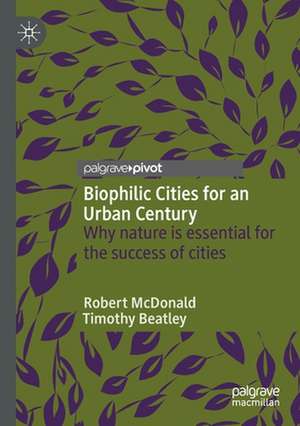Biophilic Cities for an Urban Century: Why nature is essential for the success of cities
Autor Robert McDonald, Timothy Beatleyen Limba Engleză Paperback – 27 sep 2021
This book argues that, paradoxically, at their moment of triumph and fastest growth, cities need nature more than ever. Only if our urban world is full of biophilic cities will the coming urban century truly succeed. Cities are quintessentially human, the perfect forum for interaction, and we are entering what could justly be called the urban century, the fastest period of urban growth in human history. Yet a growing body of scientific literature shows that the constant interaction, the hyper-connectedness, of cities leads to an urban psychological penalty. Nature in cities can be solution to this dilemma, allowing us to have all the benefits of our urban, connected world yet also have that urban home be a place where humanity can thrive.
This book presents best practices and case studies from biophilic design, showing how cities around the world are beginning to incorporate nature into their urban fabric. It will be a valuable resource for scholars and professionals working in the area of sustainable cities.
This book presents best practices and case studies from biophilic design, showing how cities around the world are beginning to incorporate nature into their urban fabric. It will be a valuable resource for scholars and professionals working in the area of sustainable cities.
| Toate formatele și edițiile | Preț | Express |
|---|---|---|
| Paperback (1) | 478.15 lei 6-8 săpt. | |
| Springer International Publishing – 27 sep 2021 | 478.15 lei 6-8 săpt. | |
| Hardback (1) | 484.30 lei 6-8 săpt. | |
| Springer International Publishing – 26 sep 2020 | 484.30 lei 6-8 săpt. |
Preț: 478.15 lei
Nou
Puncte Express: 717
Preț estimativ în valută:
91.52€ • 99.45$ • 76.93£
91.52€ • 99.45$ • 76.93£
Carte tipărită la comandă
Livrare economică 21 aprilie-05 mai
Preluare comenzi: 021 569.72.76
Specificații
ISBN-13: 9783030516673
ISBN-10: 3030516679
Pagini: 124
Ilustrații: XI, 124 p. 16 illus.
Dimensiuni: 148 x 210 x 16 mm
Greutate: 0.19 kg
Ediția:1st ed. 2021
Editura: Springer International Publishing
Colecția Palgrave Pivot
Locul publicării:Cham, Switzerland
ISBN-10: 3030516679
Pagini: 124
Ilustrații: XI, 124 p. 16 illus.
Dimensiuni: 148 x 210 x 16 mm
Greutate: 0.19 kg
Ediția:1st ed. 2021
Editura: Springer International Publishing
Colecția Palgrave Pivot
Locul publicării:Cham, Switzerland
Cuprins
1. The urban century.- 2. Cities as quintessentially human.- 3. Cities as inhumane: the urban health penalty.- 4. Nature as a solution.- 5. Biophilic cities: Vision and emerging principles.- 6. Innovative biophilic design and planning: From rooftop to neighborhood to city.- 7. The choice.
Notă biografică
Robert McDonald is Lead Scientist at The Nature Conservancy, based in Washington, DC, USA. He researches the relationship between cities and nature.
Timothy Beatley is the Teresa Heinz Professor of Sustainable Communities, in the School of the Architecture at the University of Virginia, USA, where he has taught for the last thirty years. He also directs the Biophilic Cities Network.
Textul de pe ultima copertă
This book argues that, paradoxically, at their moment of triumph and fastest growth, cities need nature more than ever. Only if our urban world is full of biophilic cities will the coming urban century truly succeed. Cities are quintessentially human, the perfect forum for interaction, and we are entering what could justly be called the urban century, the fastest period of urban growth in human history. Yet a growing body of scientific literature shows that the constant interaction, the hyper-connectedness, of cities leads to an urban psychological penalty. Nature in cities can be solution to this dilemma, allowing us to have all the benefits of our urban, connected world yet also have that urban home be a place where humanity can thrive.
This book presents best practices and case studies from biophilic design, showing how cities around the world are beginning to incorporate nature into their urban fabric. It will be a valuable resource for scholars and professionals working in the area of sustainable cities.
Robert McDonald is Lead Scientist at The Nature Conservancy, based in Washington, DC, USA. He researches the relationship between cities and nature.
Timothy Beatley is the Teresa Heinz Professor of Sustainable Communities, in the School of the Architecture at the University of Virginia, USA, where he has taught for the last thirty years. He also directs the Biophilic Cities Network.
Caracteristici
Concisely presents the basic principles of biophilic design Introduces a coherent intellectual framework for the value of nature in the urban century Explores how biophilic city design can counter-act growing urban psychological penalties
